Eggs Read online
Copyright © 2007 by Jerry Spinelli
All rights reserved. Except as permitted under the U.S. Copyright Act of 1976, no part of this publication may be reproduced, distributed, or transmitted in any form or by any means, or stored in a database or retrieval system, without the prior written permission of the publisher.
Little, Brown and Company
Hachette Book Group
237 Park Avenue
New York, NY 10017
Visit our Web site at www.HachetteBookGroup.com.
The Little, Brown and Company name and logo are trademarks of Hachette Book Group, Inc.
First eBook Edition: June 2007
ISBN: 978-0-316-00665-1
Contents
Copyright
Acknowledgments
Chapter 1
Chapter 2
Chapter 3
Chapter 4
Chapter 5
Chapter 6
Chapter 7
Chapter 8
Chapter 9
The Waving Man
Chapter 10
Chapter 11
Chapter 12
Chapter 13
Chapter 14
Chapter 15
Chapter 16
Chapter 17
Nightcrawlers
Chapter 18
Chapter 19
Chapter 20
Chapter 21
Painted Windows
Chapter 22
Chapter 23
Chapter 24
Chapter 25
Chapter 26
Who Cares
Chapter 27
Chapter 28
Chapter 29
Chapter 30
Chapter 31
Chapter 32
Chapter 33
Chapter 34
Chapter 35
Only Children
Chapter 36
Chapter 37
Chapter 38
Chapter 39
Chapter 40
Chapter 41
Also by Jerry Spinelli:
The Bathwater Gang
Jason and Marceline
Maniac Magee
Space Station Seventh Grade
Who Put That Hair in My Toothbrush?
To my Gettysburg College classmates
1963
Acknowledgments
It takes more than a writer to tell a story.
Many thanks to Catherine Balkin, Erin Gathrid,
Doug Fearn, Ben Spinelli, my editor Alvina Ling,
and my wife, Eileen.
1
“I don’t even like eggs,” David said.
“It’s not just the eggs,” said his grandmother.
“So what is it?” He no longer bothered to trim the surliness from his voice when speaking to her.
She thought for a moment. “Well, the activity. Participating.” Her fists gripped the steering wheel. Her face was locked straight ahead. She was a rotten and terrified driver. “Making friends.”
Make friends. Make friends. Same old garbage. “I don’t want to make friends.”
“Everybody needs friends.”
“Not me.”
“We all do, David. We’re all human.”
“I’m not.”
“No?”
“No.”
“What might you be, then?”
“A moose.”
He knew she wanted to give him a look, but she dared not take her eyes from the road. She settled for a sigh and a purse of the lips. “Now you’re just being silly.”
He let it hang there: “silly.” He said nothing. Unreplied to, the word would get bigger and bigger, filling the car, suffocating her, forcing her to open her mouth and take it back, swallow it. That would be her punishment. Maybe then she would turn around, take him home, let the Easter Egg hunt go on without him. It wasn’t even her idea anyway, it was his dad’s. They could tell him the hunt was called off, or they got there too late.
She opened the window on her side. She said, “Would you like your window open?”
He did not answer.
“David?”
“No.”
“Want the radio on?”
Question time. Try to get him to say yes.
“No.”
“Are you ever going to smile again?”
“No.”
“Are you a boy?”
“No.”
Drat. Tricked. Didn’t she know that tricks only made him hate her more? Wasn’t the trick his mother had played on him enough? More than enough? Did the world have to go on playing tricks on him?
Houses, street corners went by. This was all his life had been since April 29 of last year: a ride to somewhere he did not want to go.
They were stopping, pulling to the curb at the end of a line of cars. “We’ll have to walk from here. Looks like a good crowd,” she said, her voice all peachy cheery, like nothing had ever happened. She came around to his side. She opened the door. He stared straight ahead.
“David? Ready?”
“No.”
“They’re going to start in ten minutes.”
“Good for them.”
She reached in. She touched his shoulder. “Davey —”
He jerked away. “My name is David.”
He did not look up into her face, but he knew she was closing her eyes, trying to be patient. “Excuse me. David. You know what your father said.”
“Tell him we came and it was too crowded.”
She made a thin, wincing smile. “I don’t think so.”
He looked at her. “We could dye some eggs ourselves and say that’s what I found. I’ll dye them. You won’t have to do a thing.”
She closed her eyes, smiled painfully, shook her head.
David kicked the door and got out. His father had told him to go, but he hadn’t said anything about sticking to his grandmother. So he walked fast, zipping ahead of her. He knew she couldn’t catch up.
He walked past the sliding board and merry-go-round and the tables and benches and grills in the picnic area. And he did something that he often did at times like this. He pretended. He pretended he was doing this for his mother. He pretended she was not lying in a grave in a faraway state, but that she had awakened him the next morning, while it was still dark, just as she had promised, and they had gone out to the lake to see the sun come up, just as she had promised.
2
Still groggy with sleep, Primrose fumbled for the curtain and pushed it aside. At first she thought she was seeing the morning sun — then she realized it was not the sun after all. It was an egg, dried and splattered upon the window. Then she remembered the thumps in the night, half-heard as she lay sleeping.
She wasn’t surprised. They had egged the other place too. She knew that sooner or later her new place would be discovered. She didn’t care. Let them throw a farmful of eggs. They weren’t going to stop her from having a room of her own.
She closed the curtain. She flung off the sheet and got up — and banged her head. “Oww!” she squawked, plopping back down. She kept forgetting the low ceiling. No matter. It was worth the crouching and duckwalking and occasional bump on her head.
She sat cross-legged on the bedroll. She looked around: curtains, beanbag chair, two-drawer dresser, her dad’s picture, makeup tray, the neat stack of House Beautifuls, her sneakers side by side on the floor, just like anybody’s. Sure, there was plenty more to do — like maybe a poster for the ceiling — but it was a good start. She grinned. She giggled. She pressed her fists into her chest. She whispered up the scale to a squeal: “A room of my own!”
She stared down at the bare knees protruding from her red-hemmed nightshirt. Last night was the third time she had slept here, but only the first in her nightshirt. You can’t say a room is yours till you’ve sl
ept in it in your nightshirt. That’s what made last night so special. She giggled again.
For a good ten minutes she sat there, grinning, soaking it in. At last she folded the sheet, rolled up the bed, got dressed, and went outside.
The white of the egg-sun had slimed and dried down to the door handle. It looked like the silvery trail of a giant slug. Another egg splat yellowed the bumper.
She stepped back to the street. From the inside, with help from the curtains and a little imagination, it was easy to call it a room. But from the outside, from any angle, there was only one thing to call it: a rusty, tire-less 1977 Dodge van. A car. A junker.
But that would change. In her mind’s eye Primrose saw a houselike paint job — maybe white with blue trim — and a little white picket fence and a patch of grass and a birdbath and flower boxes for the windows. She pictured it for a little longer and went into the house. The other house.
Even now, five years after moving here, the size of the house surprised her. It was so small that, upon first seeing it, she had assumed it was a garage. Some stubborn eye within her still looked about for the house, not believing this could be it. But it was. All four rooms of it: reading room, bedroom, kitchen, bathroom. She had once seen a picture of a movie star’s clothes closet in House Beautiful. They gave the closet’s dimensions. She found a ruler and measured her house. The closet was bigger.
The reading room, as always, was dark, soft, creepy, unreal. In the bedroom, her mother slept with Willy. They lay shoulder to shoulder, on their backs, sheet under chins. The sheet’s rise and fall with her mother’s breathing sometimes fooled Primrose into thinking Willy had come alive.
She looked down at them: one mother, one teddy bear. Take away the bear, and you’d swear that was one perfectly normal mother sleeping there. Well, not quite. The dark, hushed, spooky reading room — you’d have to take that away too. And the world’s puniest house, which would make the cover of House Ugly if there were such a magazine. And the sign out front saying reader and advisor. And of course the bedroom, the one and only bedroom, the bedroom her mother actually, seriously, unbelievably (but believably too) expected to share with her teenage daughter. Take them all away and leave nothing but the lady in the bed, and then maybe you’d have yourself a normal everyday mother.
Hah! Until she woke up.
Primrose got a pitcher of soapy water, a spatula, and a rag from the kitchen and returned outside to tackle the egg splats. She hated removing egg splats. It was both difficult and degrading. Raw egg dried hard.
Finished, she realized she was hungry.
3
David felt for the memento in his pocket, something he often did at rotten times. He did not want to be here. Did not want to be standing at the top of this hill with a million other yowling and shoving kids. Did not want to go racing down the hill. Did not want to hunt Easter eggs.
Did not.
The parents were behind, cheering on their little darlings. Lots of mothers. A whole flock of mothers.
A man in a straw hat was talking through a bullhorn. The grass at the bottom of the hill was tall, shaggy. The man said that’s where the eggs were, in the grass, in front of the trees. David stared and squinted as hard as he could, but darn if he could make out a single egg. He wondered if this whole thing was a trick just to get him to make friends.
“Get ready!” commanded the bullhorn voice. Several big kids darted forward. “Hey!” David heard himself say, but the big kids were already swaggering back to the line, laughing.
“All right. Once more. Get ready!”
Again the same kids broke. This time they went halfway down the hill. The bullhorn yelled at them, told them they would be kicked out if they did it again. They came back making honking noises. Big kids.
“One last time. Get . . . rrrrready!”
The man lowered the bullhorn and glared. There were giggles and flinches, but no one broke.
“Get . . . set!”
Glare. Silence. Eyes. Bullhorn. Wait. Wait. You could almost hear the eggs. David’s toes tightened, and suddenly a kid was lurching down the hill, head over heels. He came trudging back up, yelling at the bullhorn, flinging his arm. “They pushed me! It doesn’t count!” He grabbed another big kid and heaved him down the hill. “That’s what they did!” Little kids shrieked with delight.
Somebody pushed another big kid. The kid went lurching, his legs wheeling as if on ice — as if on a wet floor — and for a moment David felt his heart stop. That was how his mother died — from a slip.
Another kid popped out of the egg-hunt line, and another. The line was no longer a line, but a smear —surging and howling, “Eggs! Eggs!” The boldest of the little kids breaking away now, and the first kid yelling, “I can see ’em!” and the landslide was on, an avalanche of kids, the bullhorn bleating in vain: “Stop! Stop!”
Alone at the top, David screamed, “Hey! Didn’tcha ever hear of rules? Hey!”
David had always been a pretty law-abiding kid, but ever since April 29 of last year, he had become a stone stickler for rules (except his grandmother’s).
And so, as the fastest kids were already plucking eggs from the grass, David remained at the top of the hill, calling, “Hey! . . . Hey!”
And now the bullhorn was aiming right at him and the voice was booming, “Young man! Go! Now!”
And down he went.
4
Eggs everywhere! Sky blue. Pink. Yellow. Lilac. Pastel treasures in a shaggy grass pie.
There were too many. He wanted them all. He wanted piles. He wanted armloads. He could not aim his attention at only one. He could not pick out the first.
Meanwhile, eggs were disappearing. Hands, as if triggered by his eyes, were snatching them as fast as he could spot them. There was a pink one! Gone. Over there! Gone. There! Gone. David was already breaking the Prime Rule of Easter Egg Hunting:
Be quick.
Gone. Gone. Gone. He was spinning himself silly. He moved nearer to the trees, looking for less busy areas. He knew now there would be no armloads. He would settle for some, several, a few. He saw big kids with three in each hand. They were ripping off the beautiful shells and chomping half an egg at a time and spewing white pieces as they laughed and pounced for more. Little kids were turning to the hilltop and hoisting their eggs and yelling, “Mommy! Look!”
And then, suddenly, he spotted one that everyone else was missing, buried in the grass, just a sliver of blue showing. He walked over to it casually, pretending he didn’t see a thing. He knelt down, combing his fingers through the grass, pretending to search. He snatched it.
It was his! A sky-blue miracle in his hand. He whirled to the sun-washed hilltop, thrust the egg high — and then the sun was gone, blotted by the bulk of a big kid.
“Where’d you get it?” the kid said.
David pointed. “There.”
The kid nodded. “That’s what I figured. It’s mine. I dropped it there.” He held out his hand. “Fork it over.”
Drat, thought David. What rotten luck. He forked it over. The kid walked away. His pockets were bulging.
By now kids were racing back up the hill, waving their treasures. David went on sweeping with his eyes, his sneakers. Nothing. Nothing but grass trampled flat.
He moved into the trees, beyond the last hunter. He knew the bullhorn man had said there were no eggs in the trees, but he didn’t say you weren’t allowed to look. And besides, it was the only hope left.
Leaves left over from last autumn crinkled underfoot. He peered into the shadows. It was different here, quiet, peaceful, indoors-like. The trees, so tall, so still, seemed to be waiting for something.
Somewhere car engines were starting up. He moved deeper into the shadows, wading through leaves, looking, looking . . . and there . . . straight ahead, a gleam of color —yellow — the clear, unmistakable roundness. Egg!
As he approached, he half-expected it to vanish or the sun-blotting kid to show up. Neither happened. What did happen was that
he noticed how tall the egg was. It was standing. A solitary yellow egg, standing on one end of a large hump of brown leaves.
He knelt beside it. He picked it up. The first thing he noticed was the red marking that circled the egg on the end where it had stood. The second thing he noticed was the dark hole that was left when he lifted the egg. How could there be a hole in a pile of leaves? With his fingertip, he moved a leaf. Red appeared. He moved another leaf. Another. He froze.
Lips.
David knew he had a choice. He could stand up and walk away and forget it all, or he could move more leaves. One thing he had learned already: the marking on the egg had come from the red lipstick on the lips of the open, O-shaped mouth that had held the egg upright like a golf ball tee. He wondered what rules were involved here.
He began to brush away leaves. A chin came into view. A nose. Cheeks. Eyes. The eyes were closed. The eyelids were a glittery purple, the cheeks a blush of pink.
He brushed away leaves until the whole face was showing. A lady’s face. Or a girl’s. He wasn’t sure. Whichever, it was the most beautiful face he had ever seen.
He spoke to the beautiful face. “Are you sleeping?”
The eyes did not open. He could not decide if he wanted them to open. The humped eyelids with their glittery purple were like tiny twin eggs, bird’s eggs.

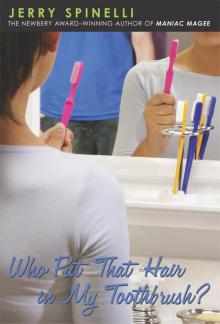 Who Put That Hair in My Toothbrush?
Who Put That Hair in My Toothbrush?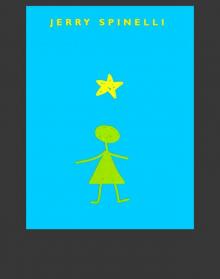 Stargirl
Stargirl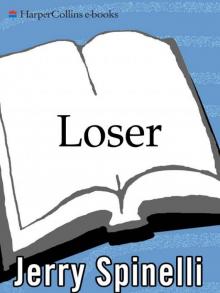 Loser
Loser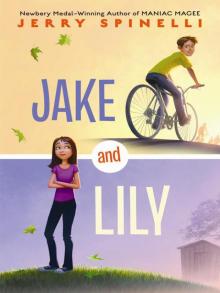 Jake and Lily
Jake and Lily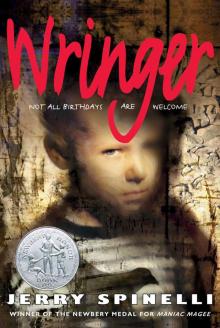 Wringer
Wringer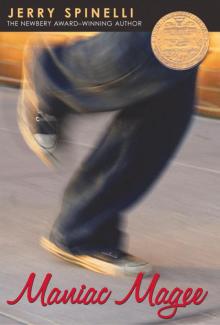 Maniac Magee
Maniac Magee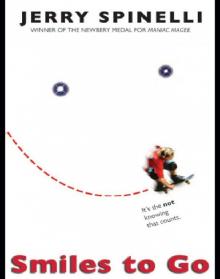 Smiles to Go
Smiles to Go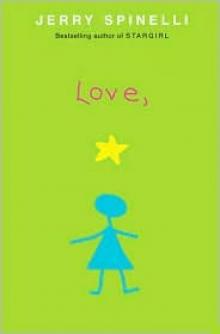 Love, Stargirl
Love, Stargirl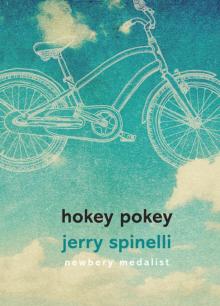 Hokey Pokey
Hokey Pokey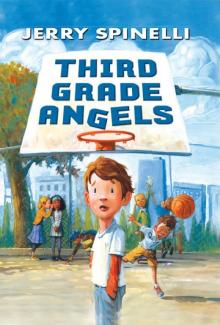 Third Grade Angels
Third Grade Angels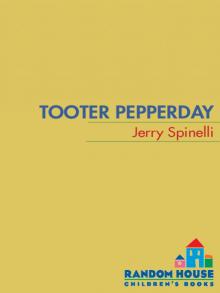 Tooter Pepperday: A Tooter Tale
Tooter Pepperday: A Tooter Tale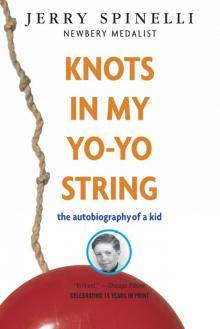 Knots in My Yo-Yo String Knots in My Yo-Yo String
Knots in My Yo-Yo String Knots in My Yo-Yo String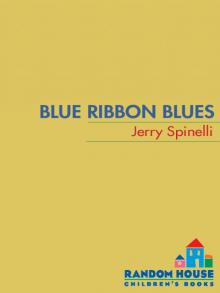 Blue Ribbon Blues: A Tooter Tale
Blue Ribbon Blues: A Tooter Tale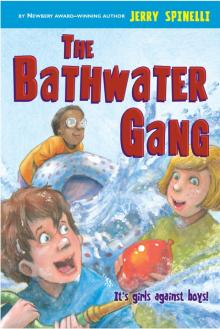 The Bathwater Gang
The Bathwater Gang Crash
Crash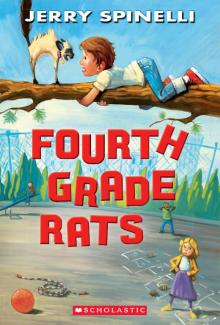 Fourth Grade Rats
Fourth Grade Rats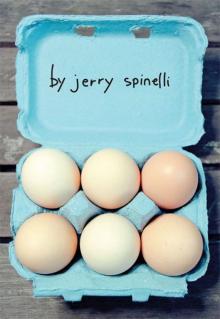 Eggs
Eggs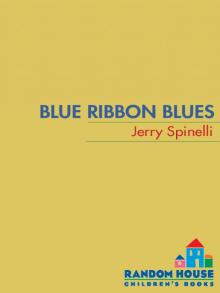 Blue Ribbon Blues
Blue Ribbon Blues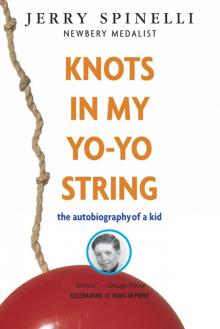 Knots in My Yo-Yo String
Knots in My Yo-Yo String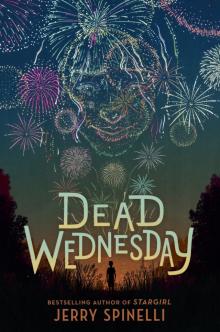 Dead Wednesday
Dead Wednesday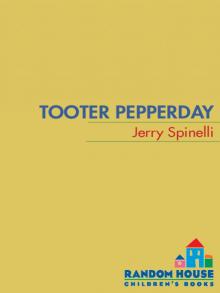 Tooter Pepperday
Tooter Pepperday